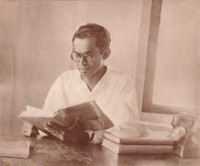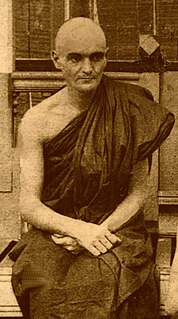
The German Dharmaduta Society is an organization established to promote Buddhism in Germany and other Western Countries, and was founded by Asoka Weeraratna, in Colombo, Sri Lanka on 21 September 1952.

The German Dharmaduta Society is an organization established to promote Buddhism in Germany and other Western Countries, and was founded by Asoka Weeraratna, in Colombo, Sri Lanka on 21 September 1952.
The idea of forming a Society to propagate Buddhism in Germany and other western countries dawned on Asoka Weeraratna, then a young businessman dealing in jewellery and Swiss wristwatches, while he was on his first business visit to Germany in 1951. Asoka Weeraratna became aware of the spiritual hunger in Germany, which was slowly recovering from total devastation due to the Second World War, and the search for an alternative moral and spiritual philosophy, that placed a very high emphasis on peace and non-violence. On his return from West Germany and convinced of the potential for growth of Buddhism in that country, Weeraratna established the Lanka Dhammaduta Society on 21 September 1952, which was later renamed the German Dharmaduta Society (GDS). Ven. Ñânatiloka Mahâthera, the well known German Scholar monk was the first Patron of the Society.
In 1953, Weeraratna, by this time the Honorary Secretary of the Society, on his second visit to Germany, made a survey of Buddhist activities in that country and published his investigations in a report entitled 'Buddhism in Germany'. The Society in 1954 launched the Million Rupee Fund under the patronage of Dudley Senanayake, the former Prime Minister, to collect funds for the permanent establishment of the Buddha Sâsana in Germany, as Arahant Mahinda had done it in Sri Lanka.
With growing public support, the Society soon won the recognition and encouragement of the State and the Million Rupee Fund was declared an Approved Charity by the Government. Among the many benefactors who contributed to this Fund, particular mention must be made of Walther Schmits, a German Buddhist, who left a valuable legacy of DM 550.000 to the Society. In 1955 the Government granted to the Society an acre of vacant crown land in Bullers Road, Colombo on a 99-year-old lease. In August 1956, Hon. S.W.R.D. Bandaranaike, Prime Minister, declared open at a ceremonial public meeting, amidst a large gathering, the newly built Headquarters and Training Centre of the Society at 417, Bullers Road (Bauddhaloka Mawatha), Colombo 7 consisting of a two-storied dormitory of 14 rooms, an Assembly Hall, Office and Library, built at a cost of Rs. 125.000.
Eight prominent Buddhist monks led by the German monk Ven. Ñânatiloka Mahâthera and including Ven. Balangoda Ânanda Maitreyya, Ven. Galle Anuruddha, Ven. Akuretiye Amaravamsa, Ven. Ñânaponika Thera (German), Ven. Kudawella Vangîsa and Ven. Vappo (German) were attached to the Centre. These monks offered their services to train German Buddhists and others in the study of Buddhist Philosophy. Friedrich Möller, a teacher from Hamburg and the first German recruit of the Society, arrived in Sri Lanka in 1953. He completed his period of training and received ordination under the name of Bhikkhu Ñânavimala.
The Society sponsored the first Buddhist Mission to Germany, which left the Colombo Harbour by ship SS Orantes on June 15, 1957. The three monks in this historic mission comprised Ven. Soma, Ven. Kheminda and Ven. Vinîta. They were all recruited from the Vajiraramaya Temple, Bambalapitiya. A few weeks later Asoka Weeraratna left Colombo by airplane and joined this Mission in Germany. He spent about five months in Germany and was able to purchase Das Buddhistische Haus from the heirs of its founder, Dr. Paul Dahlke. [1] This Buddhist Haus was built in 1923 and considered the center of German Buddhism during Dr. Dahlke's time. [2] After its 1957 purchase it was converted into a Buddhist Vihâra by the Society by providing residential facilities to Buddhist Dharmaduta monks drawn mainly from Sri Lanka. [3]
Since 1957 there has been a stream of Buddhist monks from Sri Lanka and other countries, taking up residence in the Berlin Buddhist Vihâra. Of these dedicated monks, special mention must be made of Ven. Athurugiriye Ñânavimala Mahâthera who served as the Vihâradhipati of the Berlin Vihâra for a period of 15 years (1966–1981). These monks teach the Buddha Dhamma and give instruction on meditation to Germans and people of other nationalities seeking a philosophy that places an emphasis on self-reliance, non-violence and loving kindness to all living beings.
Ven. Bhikkhu Bodhi who visited the Berlin Vihâra in May 2002 and was impressed with the self-sacrificing work of the resident monks and lay volunteers has said in a Message of Goodwill to the GDS on the occasion of the commemoration of its 50th anniversary (1952–2002) that:
The interest in Theravâda Buddhism, as the oldest historical form of Buddhism, continues to grow in the West, and thus the (Berlin) Vihâra has ahead of it enormous scope for development. As a student and friend of the late German monk, Ven. Ñânaponika Mahâthera, I have a special concern to see Theravâda Buddhism send down strong roots in Germany. [4]

Theravada Buddhism is the largest and official religion of Sri Lanka, practiced by 70.2% of the population as of 2012.
The Buddhist Publication Society (BPS) is a publishing house with charitable status whose objective is to disseminate the teaching of Gautama Buddha. It was founded in Kandy, Sri Lanka in 1958 by two Sri Lankan lay Buddhists, A.S. Karunaratna and Richard Abeyasekera, and a European-born Buddhist monk, Nyanaponika Thera. Originally conceived as a limited effort to publish small, affordable books on fundamental Buddhist topics, the Society expanded in scope in response to the reception of their early publishing efforts. The Buddhist Publication society's publications reflect the perspective of the Theravada denomination of Buddhism, drawing heavily from the Pāli Canon for source material.

Bhante Henepola Gunaratana is a Sri Lankan Theravada Buddhist monk. He is often affectionately known as Bhante G.

Bhikkhu Bodhi, born Jeffrey Block, is an American Theravada Buddhist monk, ordained in Sri Lanka and currently teaching in the New York and New Jersey area. He was appointed the second president of the Buddhist Publication Society and has edited and authored several publications grounded in the Theravada Buddhist tradition.

Buddhism in Germany looks back to a history of over 150 years. Arthur Schopenhauer was one of the earliest Germans who were influenced by Buddhism. Schopenhauer got his knowledge of Buddhism from authors like Isaac Jacob Schmidt (1779-1847). German Buddhists or Orientalists like Karl Eugen Neumann, Paul Dahlke, Georg Grimm, Friedrich Zimmermann and the first German Buddhist monk Nyanatiloka Mahathera were also influenced by Schopenhauer and his understanding of Buddhism. But also German Indologists like Hermann Oldenberg and his work ”Buddha, sein Leben, seine Lehre, seine Gemeinde“ had an important influence on German Buddhism.

Although there was regular contact between practising Buddhists and Europeans in antiquity the former had little direct impact. In the latter half of the 19th century, Buddhism came to the attention of Western intellectuals and during the course of the following century the number of adherents has grown. There are now between 1 and 4 million Buddhists in Europe, the majority in Italy, Germany, France and the United Kingdom.

Nyanaponika Thera or Nyanaponika Mahathera was a German-born Theravada Buddhist monk and scholar who, after ordaining in Sri Lanka, later became the co-founder of the Buddhist Publication Society and author of numerous seminal books and articles on Theravada Buddhism. He mentored and taught a whole generation of Western Buddhist leaders such as Bhikkhu Bodhi.

Piyadassi Maha Thera was a preacher of the Dhamma both in Sinhala and in English. He was born on 8 July 1914 at Kotahena in Colombo, Sri Lanka and was educated at Nalanda College, Colombo, thereafter at the University of Sri Lanka and the Center for the Study of World Religions at Harvard University as a research student.
Nissarana Vanaya is a renowned meditation monastery in Sri Lanka. It is located in Mitirigala in the Western province close to the town of Kirindiwela.

Ven. Nyanatiloka Mahathera, born as Anton Walther Florus Gueth, was one of the earliest westerners in modern times to become a Bhikkhu, a fully ordained Buddhist monk.

Hammalawa Saddhatissa Maha Thera (1914–1990) was an ordained Buddhist monk, missionary and author from Sri Lanka, educated in Varanasi, London, and Edinburgh. He was a contemporary of Walpola Rahula, also of Sri Lanka.

The London Buddhist Vihara is one of the main Theravada Buddhist temples in the United Kingdom. The Vihara was the first Sri Lankan Buddhist monastery to be established outside Asia.
Most Ven. Kaṭukurunde Ñāṇananda Maha Thera was a Sri Lankan [Sinhala] Bhikkhu and Buddhist scholar. He is best known for the research monograph Concept and Reality in Early Buddhist Thought and the exploratory study The Magic of the Mind. Ven. Ñāṇananda was the abbot of Pothgulgala Aranya, a small forest monastery in Devalegama, Sri Lanka.

Sīlācāra Bhikkhu, born and died as John Frederick S. McKechnie. He became a Buddhist monk in 1906 and was one of the earliest westerners in modern times to do so.

Das Buddhistische Haus is a Theravada Buddhist temple complex (Vihara) in Frohnau, Berlin, Germany. It is considered to be the oldest and largest Theravada Buddhist center in Europe and has been declared a National Heritage site.

Hikkaduwe Sri Sumangala Thera was a Sri Lankan Buddhist monk, who was one of the pioneers of Sri Lankan Buddhist revivalist movement in the 19th century. He did a great service to improve the Buddhist Education in the country and was the founder of Vidyodaya Pirivena, Maligakanda in 1873 which was granted the university status later in 1959 by the Government of Sri Lanka. A veteran author and a fiery orator, he was a major figure in the Panadurawadaya, a religious debate held between Christian missionaries and Buddhist monks in 1873 at Panadura, Sri Lanka. He was well versed in Sinhala, Pali, Sanskrit, English, Buddhism, History, Arithmetic, and Archaeology and was one of the primary sources of information on Buddhism for the success of the Panadura debate.

Asoka Weeraratna was a Sri Lankan (Sinhala) Buddhist missionary, who founded the German Dharmaduta Society in 1952. He is also the founder of the Berlin Buddhist Vihara, one of the oldest Buddhist temples in Europe and Mitirigala Nissarana Vanaya, a famous meditation monastery in the Western Province, Sri Lanka. Asoka Weeraratna later entered the Order of Buddhist monks in 1972 as Ven. Mitirigala Dhammanisanthi Thera and spent his later life as a forest monk at the Mitirigala Nissarana Vanaya for a period of 27 years.
Paul Dahlke was a German physician and one of the founders of Buddhism in Germany. He wrote extensively about Buddhist teaching and living and translated Buddhist literature into German. In 1924 he established “Das Buddhistische Haus” considered to be the first Buddhist temple in Europe.